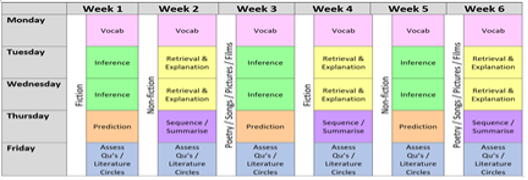Reading
READING INTENT
Reading provides the foundation to be able to access the full breadth of the curriculum, and is a key life skill. At St Luke’s, we place great emphasis on reading for both meaning and pleasure, ensuring that it is at the heart of our daily practice. From the outset, our children are immersed into the world of language through high quality texts and a language rich environment, broadening their exposure to high-level vocabulary. Our provision allows all children to have the tools to decode and be able to read for meaning, whilst encouraging a lifelong relationship with the written word.
Ultimately, our children will leave St. Luke’s as competent readers, who can recommend books to their peers, have a thirst for reading a wide range of high-quality texts across the genres, participate in discussions about books and have an established love of reading for life.
EARLY READING (Word Reading)
We use ‘LITTLE WANDLE LETTERS AND SOUNDS REVISED’ to teach phonics and graphic knowledge (common exception words and tricky words) as it offers precise structure and a ‘whole class mastery’ opportunity. The programme is begun almost immediately as children enter Reception, building upon the key aspects of Phase 1 coverage within Nursery.
Synthetic phonics is taught daily within Reception and Year 1, with further phonics instruction weaved into the Year 2 and KS2 Spelling Pathways. Pupils are taught as a whole class, focusing on individual sounds, groups of sounds and tricky words within different phases. We have an agreed progression for the teaching of new sounds, with lessons being fast-paced, highly-interactive, and challenge all pupils to apply segmenting and blending skills. This makes phonics lessons not only impactful but also fun for our children. Teachers follow the structure of Revisit & Review (previously learnt phonemes / words) Teach (new phonemes / words) Practise (new learning) and Apply (new learning) across the week, focusing on Reading, Writing and Tricky Words.
Children need to learn to read as quickly and reasonably as possible, so that they can move from learning to read, to reading to learn, giving them access to the treasure house of reading. Our expectations of progression are aspirational yet achievable; children who are not keeping up with their peers are given additional practice immediately through keep-up sessions.
Reading books in EYFS and KS1 are matched to children’s secure phonic knowledge and do not require use of alternative strategies; are closely matched to the programme used; are fully decodable at the child’s current level and do not simply practise phoneme(s) most recently taught; are not mixed with non-decodable books for independent reading practice; include a controlled, small number of ‘tricky words’ the decoding of which has been specifically taught; are continued in progressive sequence until a child can confidently decode words involving most common grapheme representations of all phonemes. As well as fully decodable books, children take home a non-decodable book for sharing that can be either read to or with them. These books play an essential role in developing a love of reading; an important distinction is that these books are being shared with the children, but they are using fully phonically decodable books to practise their independent reading.
Little Wandle Letters and Sounds Revised have resources which shows you the sounds your child will be learning and the sequence they will be learning them in. Click here to access the parent page of the Little Wandle website.
- How we teach phonics at St. Luke’s
- Phonics and early reading policy
- Phonics Progression Document
- Spelling Progression Document
READING FOR MEANING (Comprehension)
Children hear, share and discuss a range of high-quality texts within reading workshops, English sessions and across the curriculum, both in terms of fiction and non-fiction. Genres are monitored to ensure progression and breadth of coverage, and are primarily driven by topics so that children can develop their understanding and become familiar with relevant events, people, objects, concepts and subject-specific vocabulary. It is recognised that reading comprehension relies heavily on knowledge. Our broad curriculum aides reading comprehension by ensuring that children gain the knowledge of the world in which they live and bring such knowledge to their reading.
Explicit teaching of reading comprehension takes place daily within whole-class reading workshops, where the following cycle is used to teach the key reading domains:

Children can learn and retain vocabulary by being exposed to it repeatedly throughout the cycle and hence are more likely to apply it in their own speech and writing. Following a specific strand of reading, a focus is made on ‘Vocabulary’ whereby language within the text is addressed, discussed and analysed. The level of challenge increases throughout the year groups through the complexity of texts being read, building upon their knowledge of each skill.
- Reading progression
- Question Stems KS1
- Question Stems KS2
- Reading Workshops Slides (coming soon)
Reading at home is strongly promoted, with children encouraged to read every day (at home or school) and record in their diaries. Parents sign the diaries to show that they are aware of their child's reading. In addition, the school newsletter promotes reading initiatives, and we also provide special opportunities for parents to join in with parent reading sessions throughout the year – reading breakfast, mystery reader, and encouraging books to be shared in home languages on World Book Day.
50 Recommended Reads:
| EYFS | Reception |
| Year 1 | Year 2 |
| Year 3 | Year 4 |
| Year 5 | Year 6 |
